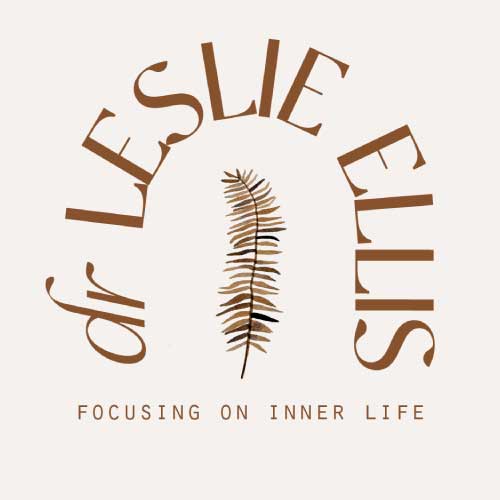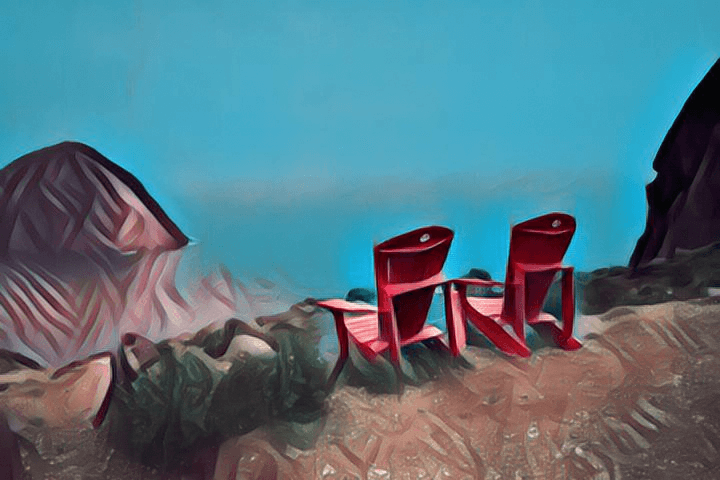Speed is the enemy of depth
This January, I was in stormy Santa Barbara at a 3-day dream tending retreat at Pacifica Graduate Institute. Midday of the first class, we were informed of flood and landslide warnings right in our location! So we hastily gathered our things and dashed to our cars in the pouring rain, navigating deepening water on the roads and with a mild sense of panic. But despite all the commotion outside, the next couple of days ended up being more focused on our inner worlds. Holed up in Oxnard at a friend’s condo safely away from the flood zone, it turned out to be a perfect venue for turning our attention inward.
My grandmother’s wisdom
In dream tending, we are invited to use our dreams as starting points for imaginal journeys. In my inner travels, my grandma Danchuk came along with me into the land of imagination, as she often does. She is my mom’s mom, and I remember her for her warm chuckle and the endless activity of her hands, always crocheting, cooking, or tending the garden.
In the dreamscape, I am itching to get going, to set off on an adventure. But she stops me and says, ‘There is no hurry.’ She is, of course, tending a garden in this imaginal landscape. Through this, she illustrates for me the importance of patience. First we prepare the soil, and plant the seeds. And then we wait. When the plants sprout, we weed, water and tend. But again, we wait. There are bouts of activity, but mostly, gardening is an act of patience. This is not my strong suit, but I sit next to my grandma on a lounge chair and look out at the water. It is wonderful to simply slow down. My body likes it. In our sped-up and distracted culture, I believe we all need more of this.
Speed is the enemy of depth
Coincidentally, I have been reading a book called Stolen Focus – in which Johann Hari explores the multiple causes for our shrinking attention spans. He says it’s not our fault, and nor are social media and the internet the sole causes (although they do contribute greatly to the problem). Hari found that our collective attention span has been shrinking for more than 100 years because of the massive expansion of information we are bombarded with.
Quoting Danish math professor Sune Lehmann, Hari notes that this information explosion comes at a great cost. “What we are sacrificing is depth in all sorts of dimensions… Depth takes time. And depth takes reflection.” Speed is the enemy of depth. When we are exposed to more information than we can actually process, we experience a “rapid exhaustion of attenion resources.”
Mind-wandering is essential for creativity
A huge casualty of the information explosion is down-time for our minds. When we simply allow our minds to wander, we make creative new connections. Mind-wandering, day-dreaming and night dreaming are all on the opposite end of the continuum from focused, goal-oriented attention. This is not a waste of time, but actually improves our ability to think and focus.
Hari interviewed McGill neuroscientist Nathan Spreng to find out more. He found that “the more you let your mind wander, the better you are at having organized personal goals, being creative and making patient, long-term decisions.” Hardly the enemy of productivity, freeing your mind does three things: it enables you to make better sense of your life, make creative new connections, and engage in ‘mental time-travel’ that better prepares you for the future.
Interestingly, this imaginal travel is often what happens in dreaming. We are exploring a wide range of possibilities, and freeing ourselves from too narrow a focus. When I go back to the imaginal lounge chairs with my grandma Danchuk, I find another wonderful benefit. This relaxed approach feels better in my body, and I feel able to make warm and easy interpersonal connection that seems to translate from dream to waking life.
In the Oxnard condo, there were three of us thrown into close quarters with the assignment to engage in imaginal travels and to tend to each other’s dreams. This open, playful space brought us into deep connection, into matters of the heart and soul in ways that simply would not have happened if we had been in a task-oriented rush. I am taking my grandma’s words to heart: there is no hurry.
References
Stolen focus, Why you can’t pay attention and how to think deeply again (2022) by Johann Hari. New York, Penguin Random House
(Interestingly, Hari dedicates this book to his grandmothers.)

